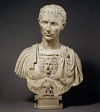GAIUS JULIUS CAESAR (102-44 B.C.), the great Roman soldier and statesman, was born on the 12th of July 102 B.C.[1] Early years. His family was of patrician rank and traced a legendary descent from Iulus, the founder of Alba Longa, son of Aeneas and grandson of Venus and Anchises.
 Caesar made the most of his divine ancestry and built a temple in his forum to Venus Genetrix; but his patrician descent was of little importance in politics and disqualified Caesar from holding the tribunate, an office to which, as a leader of the popular party, he would naturally have aspired. The Julii Caesares, however, had also acquired the new nobilitas, which belonged to holders of the great magistracies.
Caesar made the most of his divine ancestry and built a temple in his forum to Venus Genetrix; but his patrician descent was of little importance in politics and disqualified Caesar from holding the tribunate, an office to which, as a leader of the popular party, he would naturally have aspired. The Julii Caesares, however, had also acquired the new nobilitas, which belonged to holders of the great magistracies.
Caesar's uncle became consul in 91 B.C., and his father held the praetorship. Most of the family seem to have belonged to the senatorial party (optimates); but Caesar himself was from the first a popularis. The determining factor is no doubt to be sought in his relationship with C. Marius, the husband of his aunt Julia. Caesar was born in the year of Marius's first great victory over the Teutones, and as he grew up, inspired by the traditions of the great soldier's career, attached himself to his party and its fortunes.
Of his education we know scarcely anything. His mother, Aurelia, belonged to a distinguished family, and Tacitus (Dial. de Orat. xxviii.) couples her name with that of Cornelia, the mother of the Gracchi, as an example of the Roman matron whose disciplina and severitas formed her son for the duties of a soldier and statesman. His tutor was M. Antonius Gnipho, a native of Gaul (by which Cisalpine Gaul may be meant), who is said to have been equally learned in Greek and Latin literature, and to have set up in later years a school of rhetoric which was attended by Cicero in his praetorship 66 B.C. It is possible that Caesar may have derived from him his interest in Gaul and its people and his sympathy with the claims of the Romanized Gauls of northern Italy to political rights.
Caesar lost his father in 88 B.C., when only sixteen years old, and assumed the toga virilis as the token of manhood. The social war (90-89 B.C.) had been brought to a close by the enfranchisement of Rome's Italian subjects; and the civil war which followed it led, after the departure of Sulla for the East, to the temporary triumph of the populares, led by Marius and Cinna, and the indiscriminate massacre of their political opponents, including both of Caesar's uncles.
Caesar was at once marked out for high distinction, being created flamen Dialis or priest of Jupiter. In the following year (which saw the death of Marius) Caesar, rejecting a proposed marriage with a wealthy capitalist's heiress, sought and obtained the hand of Cornelia, the daughter of Cinna, and thus became further identified with the ruling party. His career was soon after interrupted by the triumphant return in 82 B.C. of Sulla, who ordered him to divorce his wife, and on his refusal deprived him of his property and priesthood and was induced to spare his life only by the intercession of his aristocratic relatives and the college of vestal virgins.
Released from his religious obligations, in 81 B.C. Caesar left Rome for the East and served his first campaign under Minucius Thermus, who was engaged in eliminating the last vestiges of resistance to Roman rule in the province of Asia, and received from him the "civic crown" for saving a fellow-soldier's life at the storm of Mytilene.
In 78 B.C., while serving under Servilius Isauricus against the Cilician pirates, the news of Sulla's death reached him and he at once returned to Rome. Upon arriving there, he refused to become entangled in the abortive and equivocal schemes of Lepidus to subvert the Sullan constitution. Caesar did, however, take up the only instrument of political warfare left to the opposition by prosecuting two senatorial governors, Cn. Cornelius Dolabella (in 77 B.C.) and C. Antonius (in 76 B.C.) for extortion in the provinces of Macedonia and Greece. Though Caesar lost both cases, he most certainly convinced the Roman world of the corruption of the senatorial tribunals.
After these failures Caesar decided not to take an active part in politics for a time, and retraced his steps to the East in order to study rhetoric under Molon, at Rhodes.
On his journey, he was caught by pirates, whom he treated with consummate nonchalance while awaiting his ransom, threatening to return and crucify them, and, when released he lost no time in carrying out his threat!
While he was studying at Rhodes, the third Mithradatic War broke out, and Caesar at once raised a militia made up of volunteers and helped to secure the wavering loyalty of the provincials of Asia.
Upon Lucullus assuming command of the Roman troops in Asia, Caesar returned to Rome, to find that he had been elected to a seat on the college of pontifices which had been left vacant by the death of his uncle, C. Aurelius Cotta. He was likewise elected first of the six tribuni militum a populo, but little is known of his service in this capacity. Suetonius tells us that he threw himself into the agitation for the restoration of the ancient powers of the tribunate which had been curtailed by Sulla, and that he secured the passing of a law of amnesty in favour of the partisans of Sertorius.
Despite that, however, he was not able to accomplish the complete overthrow of the Sullan régime; the crisis of the Slave War placed the Senate at the mercy of Pompey and Crassus, who in 70 B.C. swept away the safeguards of senatorial ascendancy, restored the initiative in legislation to the tribunes, and replaced the Equestrian order, i.e. the capitalists, in partial possession of the jury-courts. This judicial reform (or rather compromise) was the work of Caesar's uncle, L. Aurelius Cotta. Caesar himself, however, experienced no increase of influence as a result.
In 69 B.C. he served as quaestor under Antistius Vetus, governor of Hither Spain, and on his way back to Rome (according to Suetonius) promoted a revolutionary agitation among the Transpadanes for the acquisition of full political rights, which had been denied them by Sulla's settlement.
Opposition to the Optimates
Rome
the Eternal City
Sitemap
Travel
|

